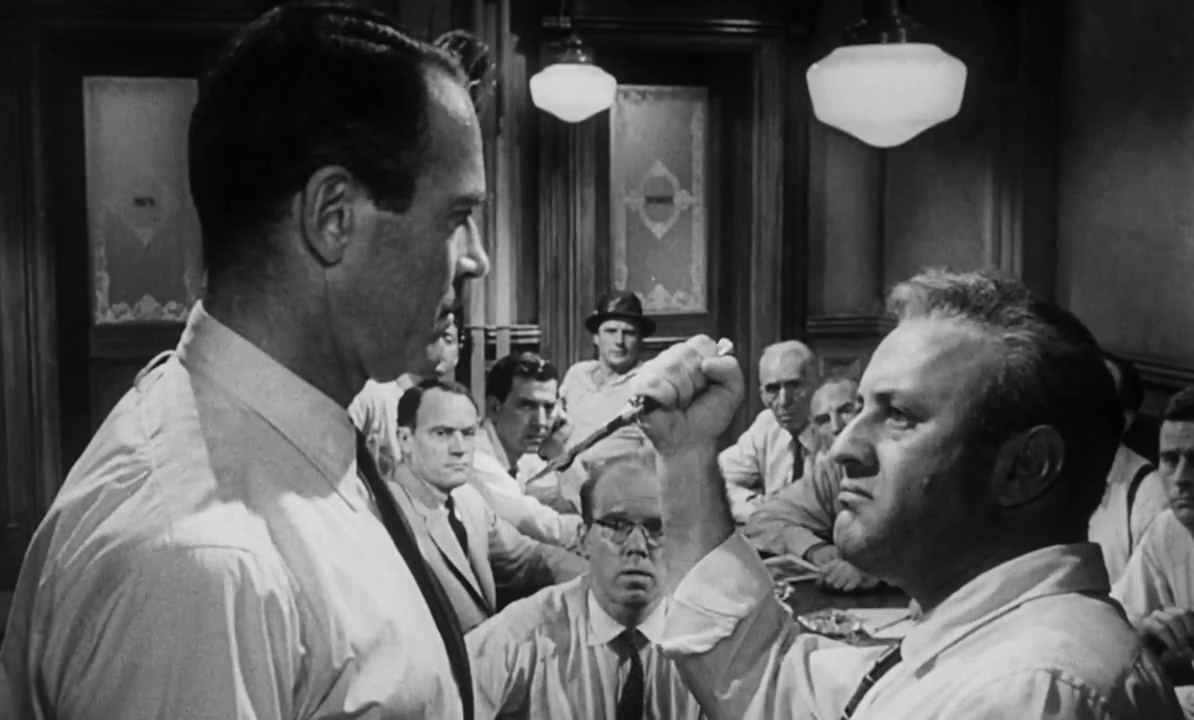One is an unrepentant racist. Another is filled with rage for his grown son. There’s the guy who has Yankees tickets burning a hole in his pocket. There’s an ad man, a stockbroker, a proud immigrant and a blue collar working man. And there’s the stoic architect — the one who actually wants to hear everyone out, who takes his responsibility as a juror with the seriousness appropriate when a defendant’s life is at stake.
Sixty-seven years after its release, 12 Angry Men remains an explosive drama of small-scale democracy, bottled up in a jury room where individual prejudices and passions gradually coalesce into a collective voice. Confined almost entirely to a single, claustrophobic set, Sidney Lumet’s remarkable feature film debut is a nearly perfect movie, with an airtight screenplay by Reginald Rose (adapting his own play) and a dozen top-flight performances providing an early indication of the magic Lumet would work with actors over the next 50 years. A Lumet cast is like a single organism, moving and thinking together toward a common purpose.
The energy of 12 Angry Men is thrillingly combustible. A young Hispanic man, barely seen in the film, is on trial for murdering his father. As the jurors retire to deliberate on a hot, rainy New York evening, most of them are eager to convict and get on with their lives. But there’s a fly in the ointment, Juror 8, played by Henry Fonda with every ounce of his Everyman appeal. (We actually learn the character’s name at the very end of the film, but, in the spirit of democracy, let’s stick with Juror 8). He acknowledges that the defendant may, in fact, be guilty. But, unlike the other jurors, he wants to talk about it. He has an inkling of reasonable doubt. He seems to understand, and care about, the “innocent until proven guilty” concept. Bit by point, point by point, he pokes holes in the prosecution’s case. His jury mates are by turns incredulous, irate, confused. But they start to listen, some more quickly than others. And the worm, as they say, begins to turn.

It is Juror 11, the European immigrant played by the Czech actor George Voskovec, who almost offhandedly states the film’s theme: The American jury system is a sort of thorny miracle. Twelve complete strangers are summoned to serve the criminal justice system. They observe a trial, hear the arguments and then deliberate based on the evidence. But they can’t check their humanity at the door (maybe someday we’ll have AI jurors). In 12 Angry Men they bring their life stories, their personal beliefs and temperaments, into that sweltering room. (The jurors don’t figure out how to turn the fan on until the second half of the film; Juror 7, played by Jack Warden, is drenched in sweat through much of the movie.) They pontificate. They bicker. They point fingers. Two of them, Fonda’s Juror 8 and Lee J. Cobb’s bellicose Juror 3, almost come to blows. And they plow ahead.
Here’s another minor miracle: 12 Angry Men never comes close to turning into a dry, pious civics lesson. Every exchange, every word, conveys drama, conflict and, finally, resolution. The big moments never fail to excite: When Juror 8 whips out a switchblade knife, not to use it, but to show how easy it is to procure the supposedly rare weapon with which the victim was stabbed. When Cobb’s Juror 3 goes ballistic, shouting “I’ll kill him!” toward Fonda’s Juror 8, thereby proving that particular exclamation shouldn’t always be taken literally. When Ed Begley’s Juror 10 dissolves into a racist rant — “There’s not a one of ‘em who is any good!” — and his fellow jurors, one by one, get up and leave the table, leaving the bigot to his own hate. 12 Angry Men comes at the viewer in waves, cresting and receding but never losing its power.
Rose originally wrote the play in 1954, at a time when juries were indeed mostly made up of men. This, of course, is no longer the case. Subsequent versions for the stage have been called Twelve Angry Jurors — this is the version I first encountered as a high school student in the ‘80s, before I saw the film — and even Twelve Angry Women. This evolution is another, real-life example of democracy in action. The film, however, is also an exercise in testosterone boiling over in close quarters. 12 Angry Men would miserably fail the Bechdel test, which measures the representation of women in film. Yet somehow it still feels modern, hitting with the force of a judge’s gavel.
